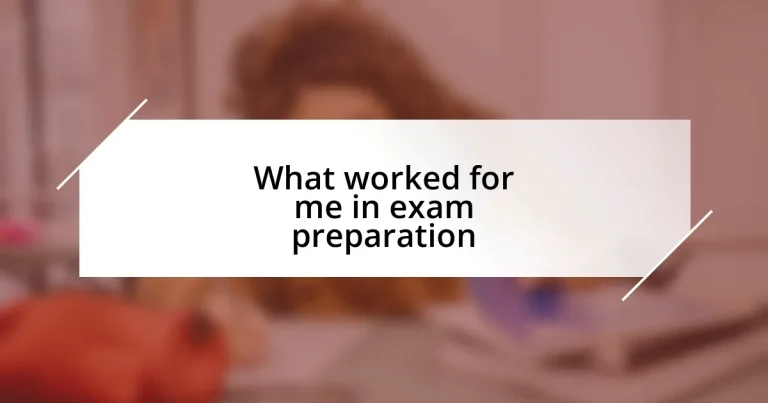Key takeaways:
- Creating a structured study schedule and prioritizing tasks enhances focus and reduces overwhelm.
- Active recall, such as using flashcards and self-testing, boosts retention and understanding of material.
- Engaging in group studies can transform learning into a collaborative, motivating experience.
- Regular reflection on progress helps identify strengths and weaknesses, fostering continuous improvement.

Effective study techniques
When it comes to effective study techniques, I’ve always found that creating a structured schedule worked wonders for me. Initially, I would cram everything in a night before, but once I started dedicating specific hours to each subject throughout the week, I discovered a profound difference. Have you ever noticed how much more focused you feel when you approach study time like you would an important meeting?
Another technique that truly helped was active recall. Instead of passively reading my notes, I began testing myself on what I had learned. I vividly remember sitting with flashcards, sometimes questioning the very essence of a concept right before it slipped my mind. It was almost exhilarating to see how much I could remember—and it felt like a mini victory every time I got a question right.
Lastly, I can’t stress enough the power of group studies. Some of my most engaging study sessions were with friends, where we turned learning into a fun activity filled with laughter and shared insights. Have you ever had that moment when someone else explains a tricky topic, and suddenly, it clicks? Those shared experiences made the information stick like glue.

Time management strategies
Time management in exam preparation is all about finding the right balance. I remember the times when I felt overwhelmed, chasing deadlines and drowning in assignments. It was a game changer when I started using time blocking—allocating specific chunks of time to study different subjects. I’d set a timer for 25 minutes of focused study followed by a 5-minute break. This method not only kept me productive but also created a rhythm that made learning enjoyable.
Here are some strategies that worked for me in managing my time effectively:
-
Prioritize Tasks: Identify what’s urgent versus what’s important. I often made a to-do list and highlighted critical tasks, which guided me on what to tackle first.
-
Set Specific Goals: Instead of vague plans like “study math,” I’d say, “master chapters 1-3.” Clear goals kept me motivated and provided a sense of accomplishment when I completed them.
-
Limit Distractions: I’d put my phone on silent and use apps that block social media during study sessions. The fewer distractions, the more I could dive into my studies.
-
Reflect Weekly: At the end of each week, I’d review what worked and what didn’t. Making adjustments became second nature, allowing me to refine my approach continually.
-
Be Flexible: Life happens, and I learned the importance of adapting my plans. If a study session didn’t go as intended, I’d adjust rather than stress; it’s all part of the process.
These strategies transformed my study sessions from chaotic sprints into more manageable, engaging experiences.

Gathering study materials
When it comes to gathering study materials, organization is key. I remember how frustrating it used to be to comb through various sources to find relevant notes or textbooks. I quickly learned the importance of centralizing all my materials in one place, whether it was a physical binder or a digital folder. This not only saved time but also gave me a sense of control over my study environment, reducing the anxiety that often comes with exam preparation.
One invaluable tool I found was creating a resource list—not just for textbooks but also for websites and online videos that explained difficult concepts. I recall spending an entire afternoon curating a collection of YouTube tutorials that demystified physics for me. The moment I realized I could access different perspectives on a single topic sparked my engagement and understanding. It’s like building a toolkit; the more tools I had, the easier it became to tackle challenges.
I also discovered the power of collaborative resources. Connecting with classmates to exchange notes or share past quizzes opened up a treasure trove of insights. There was one instance when a friend shared his notes from a lecture I had missed, and the moment I read through them, everything clicked into place. Have you ever had that experience where someone else’s notes suddenly make a complex idea feel crystal clear? I encourage you to tap into your network—it can really enhance your preparation process.
| Study Material Type | Example |
|---|---|
| Textbooks | University recommended texts |
| Online Resources | Videos, articles, and forums |
| Notes | Class notes and peer notes |
| Past Exams | Previous years’ papers |

Creating a study schedule
Creating a study schedule was a defining moment in my exam preparation journey. I still remember the first time I laid out a detailed weekly study plan. The relief washed over me as I visually mapped out my priorities. It wasn’t just about filling up time; it brought structure, making each day feel purposeful.
One approach that worked wonders for me was breaking my study sessions into smaller, manageable blocks. I’d think about what I could realistically cover in a couple of hours and then list the specific tasks. You might wonder, how does this help? For me, the satisfaction of checking off each item created a sense of accomplishment that turned the long slog of studying into a series of small victories.
Another key aspect was incorporating regular review sessions. At first, I wasn’t sure if these sessions were worth the time investment. But, as I started reviewing my notes weekly, I found that revisiting material helped cement my understanding. It’s like watering a plant—occasionally revisiting concepts kept them fresh and thriving in my mind. Creating a study schedule not only organized my preparation but also transformed how I saw my learning process; it became less daunting and more empowering.

Practicing with past exams
Practicing with past exams became a game changer in my preparation routine. I remember opening that first past paper and feeling a wave of anxiety wash over me. However, as I worked through the questions, I felt an exhilarating mix of fear and excitement. It was like preparing for a performance, understanding that every question could be a plot twist. Did you ever think about how you might tackle an exam question in real-time? For me, practicing with previous exams gave me a sense of authenticity; it was as if I was stepping into the actual exam room, which by the way, helped me manage my nerves during the real deal.
As I progressed, I started timing myself while tackling these past papers. Initially, I struggled with pacing, but I soon discovered how important it was to understand how long I could afford to spend on each question. I clearly remember when I realized I finished a paper with minutes to spare—an incredible feeling! That practice made me feel like I could conquer anything when the actual exam day arrived. Have you ever found that sweet spot where you feel totally in control? It’s a liberating experience that can boost your confidence immensely.
What I found particularly enlightening was going through the mark schemes after completing a paper. The first time I did this, I was shocked at how much I had misunderstood in my practice answers. I learned that the examiners weren’t just looking for correct answers; they wanted to see my reasoning laid out clearly. In a way, it was my first glimpse into the mind of someone grading my exam. This reflection not only improved my technique but also deepened my understanding of the material. Ups and downs in the learning process are normal—it’s all about how you reflect on them and grow!

Maintaining motivation levels
Maintaining motivation can often feel like an uphill battle, but I discovered a few strategies that changed the game for me. During my preparation, I made it a point to celebrate small milestones—like completing a chapter or nailing a tricky concept. Have you ever paused to appreciate your progress? That feeling of acknowledgment really fueled my desire to keep going, like adding fuel to a fire.
In challenging moments, I found that connecting with study groups made a world of difference. Sharing insights and discussing difficult topics created a sense of camaraderie, which kept my spirits up. I vividly remember one late-night study session where laughter broke through my stress. It made me realize that studying doesn’t always have to be a solitary slog; it can be a shared journey filled with support and motivation.
I also learned to embrace self-compassion when motivation waned. Instead of beating myself up over missed study goals, I began to ask myself why I was feeling unmotivated. Was I tired? Overwhelmed? Acknowledging these feelings helped me adjust my study plan and take breaks when necessary. Have you experienced the power of simply being kind to yourself? Sometimes, a little grace goes a long way in rekindling that internal spark to continue moving forward.

Reviewing and reflecting on progress
Reflecting on my progress became a critical part of my study routine. I often found myself jotting down notes after each study session to capture what I had learned and where I stumbled. Have you ever taken a moment to write about your learning experiences? This process helped me identify patterns in my mistakes, which ultimately shaped my approach moving forward. It was like developing a personal roadmap, guiding me through my preparation journey.
When I revisited my notes, I would highlight concepts I had grasped and underline those I still struggled with. This visual representation served as a constant reminder of my growth. I clearly recall the satisfaction I felt when reviewing my earlier notes—seeing how far I had come was incredibly motivating. There’s something powerful about tracking your evolution, don’t you think? It not only boosts confidence but also encourages commitment to mastering the material.
Finally, after each major study milestone, I set aside time to reflect on my emotional state. I realized that acknowledging my anxieties and triumphs made a world of difference in how I perceived my progress. One evening, as I reflected on my preparation, I burst out laughing at the sheer number of worries I’d had that turned out to be unfounded. Isn’t it interesting how our minds can amplify our fears? Understanding and managing these feelings gave me a clearer perspective and reinforced my determination to succeed.














